While we’ve all been busy worrying about the pandemic and rioters destroying our cities, the calendar has been marching on. Time, they say, doesn’t stand still for any man, and apparently it doesn’t stand still for a virus either. We’re already into the hurricane season, with two tropical storms behind us.
According to the National Hurricane Center, this is probably going to be a worse than average hurricane season. I’m not sure how accurate their predictions are, but it doesn’t matter. This will be the first hurricane season we’ve faced with COVID-19, let alone any of the other problems the year has brought us. That’s enough to guarantee that it’s going to be a rough hurricane season.
Bugging Out Is Going to Be Rough
If you live in a hurricane zone, then you really need to be ready this year. More than any year in the past, bugging out, if necessary, will be a real challenge this year. The biggest problem is going to be in finding someplace you can go, should you need to bug out.
This problem actually contains two parts. The first is finding a hotel where you can go. That’s always a problem, but this year there’s the added problem of social distancing. Hotels in some states are required to implement social distancing measures this year, just like restaurants do. So you may have to drive farther to find a hotel with available rooms, than you would have had to in other years.
On top of that, some cities may not welcome you in, especially if you come from a hotspot. There have already been several states which have instituted travel restrictions from other states which have high COVID-19 case counts. I doubt they’ll lift that for a hurricane.
Related: How to Prepare For A Pandemic
The solution to these potential problems is three-fold:
- First of all, don’t bug out unless you feel you have to. Most of us have that attitude anyway, so it’s not much of a problem. Prepare your home to ride out the hurricane and then shelter there.
- If you do decide you need to bug out, then leave early, before the government issues an evacuation order. That’s about the only way that you can be sure of being able to find a hotel within 300 miles. Besides that, you might beat any efforts to keep people from your area from invading destination towns.
- Plan on camping out and prepare for it. Even if you are planning on going to a hotel somewhere, take camping gear along with you. That way, if the hotels are full and you can’t find anywhere to go, other than an emergency shelter, you can pitch camp wherever you are. Just be sure to think it through, so that you won’t get soaked.
Before you say anything, I realize those three things contradict each other. Even so, they should all be part of your plan. Think of them as plans A, B, and C. Then decide at what point you’ll need to put Plan B (bug out) into effect. That will probably be something like a Category 4 hurricane heading right for you.
So What Do You Need?
If you’re like a lot of us, you’ve probably dipped into your prepping stockpile already this year. The numerous shortages that have existed in our grocery stores have caused us to use food, cleaning supplies and paper products that we had set aside for an emergency. That’s okay, that’s what they were there for, but I’d take this opportunity to do an inventory and restock everything, as much as possible.
Don’t think of a hurricane as a three day problem. It has been clear in the case of every major hurricane since Katrina, that things don’t get back to normal quickly and relief supplies don’t arrive on time. In every case I’ve been able to check on, people were literally dumpster diving, looking for food, weeks after the hurricane hit.
Besides that, there are some specific things you should stockpile to make it through the first COVID hurricane season:
As Far As Your Windows Go
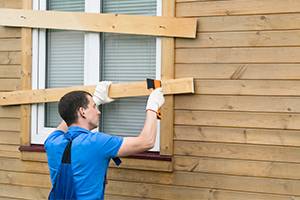 If you’re going to stay home, then you need to be ready to cover your windows with plywood.
If you’re going to stay home, then you need to be ready to cover your windows with plywood.
Taping the windows, as some people recommend, isn’t enough to keep them from breaking, especially if something hits the glass. All that does is help hold the glass in place.
Many people wait until it’s too late to buy plywood and the stores run out. You’re better off having covers for your windows prepared and kept in the garage or basement, so that you have them. Cut them to size, make sure they’ll fit, and then mark them, so you know which window they go on.
Related: How To Make A Pantry Under Your Bed
Protect Your Home From Further Damage
Blue plastic tarps are great for protecting your home from further damage, should it become damaged by the hurricane. It doesn’t matter if we’re talking about roof shingles coming off, or a tree branch crashing through a window. You can cover up the hole with a tarp and a staple gun.
Of course, you don’t want to try and put those tarps on your home in the midst of the hurricane. That would probably just result in the loss of the tarp and you getting soaked. But once it is over, you’ll want to protect your home from further damage.
Gasoline
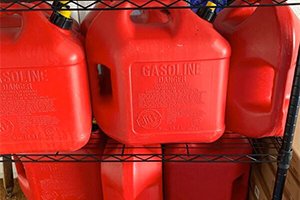 Few people bother to stockpile gasoline, mostly because it doesn’t keep well. You can only store it for about six months, maybe 12, if you add a life extender to it.
Few people bother to stockpile gasoline, mostly because it doesn’t keep well. You can only store it for about six months, maybe 12, if you add a life extender to it.
Even so, you should have a couple of cans of gas stockpiled for a hurricane, over and above trying to keep your gas tank full. You can always replace that gasoline later, burning it in your car or lawnmower.
One of the problems with any mass evacuation is that gas stations run out. Then people are stuck along the road, waiting until trucks can bring in more gas. That’s obviously not a good position to be in. Keeping an extra 5 or 10 gallons of gas on hand will help ensure you can get to your destination, even when others can’t.
If you can, I’d recommend keeping that gas in metal gas cans, rather than plastic ones. While the plastic ones are safe for gasoline, they’re really not designed for long-term storage. When the gas heats and expands, it puts a lot of pressure on the material the gas can is made of. I’ve had that cause more than one gas can to leak.
As Far As Your Health Goes
With COVID-19 still raging across the land, there’s always a chance of a family member coming down with the disease. Besides that, we’re heading into flu season, with all the misery and discomfort that entails. Between the two, it’s a good time to stock up on over-the-counter medicines that help treat symptoms of respiratory illness. Granted, those medicines aren’t going to cure COVID, but they might help you deal with the symptoms. They’ll definitely do that for the flu.
If you have to bug out, you want to make sure that you take any prescription medicine which family members need to take for chronic conditions. I’d suggest trying to get your doctor to give you a prescription for some extras, so that you can keep those in your bug out bag or vehicle.
Always Good to Have
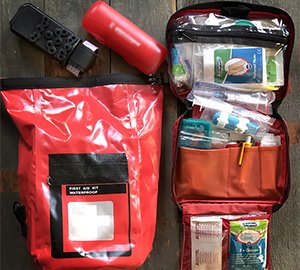 There’s always a high chance of injury in the midst of a natural disaster. The forces that nature can unleash are so far beyond anything that mankind has invented, that we have trouble dealing with them.
There’s always a high chance of injury in the midst of a natural disaster. The forces that nature can unleash are so far beyond anything that mankind has invented, that we have trouble dealing with them.
A hurricane, especially a Category 4 or 5, has winds so high that it can turn loose objects into projectiles, causing injury when they hit.
I’m not talking about a $19.99 kit from you local pharmacy here, but rather a good trauma kit. That small, low-cost kit might be good for a paper cut or a skinned knee, but that’s about it. You need something that can take care of larger injuries. Better yet, you need two, so you can keep one in your vehicle.
Water and a Means to Purify Water
If there’s anything that’s standard prepping supplies, other than food, this is it. We can’t count on the city water supply remaining on during a hurricane, especially if there is flooding. That could cause contamination of the system, forcing officials to shut it down. Not only that, if you have trouble finding somewhere that will accept you, in the case of a bug out, you may have to purify water that nature provides.
⇒ The Awesome DIY Device That Turns Air Into Fresh Water
Once again, this is something that you want in both your home and your vehicle. Don’t just count on a straw-type water filter either. The water purifier in your car must be good enough to provide water for your whole family.
Emergency Lighting
Chances are very high that any hurricane will cause power outages. Our electrical distribution grid just isn’t strong enough to withstand the high winds and there is always the chance of broken tree branches bringing down power lines. Making matters worse, if you cover your windows with plywood, it’s going to get real dark inside your home.
Most people talk about having flashlights and spare batteries for emergency lighting. That’s fine, as far as it goes. But if you’re going to count on flashlights, be sure that you have plenty of them to go around. You don’t need a good flashlight, you need one for every member of your family, plus a couple of spares.
I’d also recommend having some other lighting source, such as the old-style Coleman “dual-fuel” lanterns. Those will run off of gasoline, so since you’re going to have gasoline anyway, that will hopefully ensure that you’ve got plenty of fuel for those lanterns.
A Means to Cook without Power
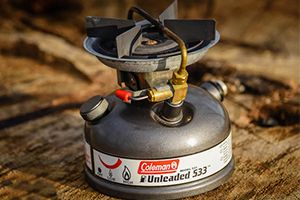 If the power goes out, so does your ability to cook, if you have an electric stove. Chances are pretty good that the gas will remain on, but you can’t be sure.
If the power goes out, so does your ability to cook, if you have an electric stove. Chances are pretty good that the gas will remain on, but you can’t be sure.
You can’t really count on cooking with wood in a hurricane either, as it will most likely be raining and windy.
Even if you try and wait it out, you’re still going to have the problem of your firewood being soaked to deal with. It would be a good idea to have a camping stove, along with a good supply of fuel, that you can use.
My preference is the Coleman “dual fuel”, which will run off of gasoline. I still remember watching my dad cooking on one of these when we went camping. They haven’t changed much.
How to Keep Up With News
You’re going to need to keep up with the news about what’s happening and the easiest way to do that is with a radio. Be sure to get a good one, preferably with an extendable antenna for extra range. It has to be battery powered, so that you can use it when the power goes out. Make sure you’ve got plenty of extra batteries.
Related: 50 High Value Items To Stockpile For When SHTF
When Power Is Out
That radio isn’t the only thing you need extra batteries for. You should also have an extra battery pack or two for your phone, so that you can recharge it when there is no power. We depend on our phones for so much today, including getting the news.
Don’t just depend on having a charger, or even a car charger. Something could happen to your car, where you can’t use it to recharge your phone. Make sure you’ve got something that’s totally independent, even if it only allows you to recharge your phone once or twice.
As Far As the Pandemic Goes
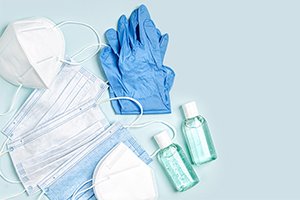 In this time of COVID-19, you’ve got to have masks and gloves to protect yourself with. That would be especially true in a mass evacuation, where everywhere you go is likely to be crowded with people.
In this time of COVID-19, you’ve got to have masks and gloves to protect yourself with. That would be especially true in a mass evacuation, where everywhere you go is likely to be crowded with people.
I seriously doubt there will be much possibility of social distancing, unless you do what I suggested earlier and go camping when you bug out.
Don’t count on being able to buy these when you bug out. There are still a lot of shortages, especially of gloves. If you’re caught with a lot of other people bugging out, they’ll probably empty the stores. Be sure to keep at least a box of each in your car, just in case.
Hand Sanitizer
Like the masks and gloves, you would better count on bringing your own hand sanitizer in the event of a bug out. While manufacturers have been churning hand sanitizer out and you can find it just about anywhere, that may not be the case when bugging out.
Keep some in your car, just to be sure you’ll have it. Since bugging out means you’ll be traveling, you’ll probably go through more than if you were staying home, so be generous in how much you take along.
Disinfectants
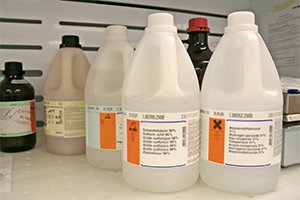 If you are fortunate enough to find a hotel that you can stay in, you probably shouldn’t count on the quality of the disinfecting process the housekeeping staff has done.
If you are fortunate enough to find a hotel that you can stay in, you probably shouldn’t count on the quality of the disinfecting process the housekeeping staff has done.
While I’m sure there are excellent people out there who are doing an excellent job, I’m equally sure there are those who are just giving it a lick and a promise. It makes sense to disinfect your own hotel room, as soon as you go in.
Avoid bleach as a disinfectant, as it can discolor bedspreads and upholstery. However, you can use alcohol or hydrogen peroxide without problem. I’d be sure to have a spray bottle, as well as disinfectant wipes. The spray bottle will allow you to spray down the bedding, before using the beds.
Related: 36 Survival Uses For Hydrogen Peroxide
Camping Equipment
As I mentioned earlier, your Plan C should be camping out. That means having the right equipment to do so. While most of us have camping gear for a bug out, it might not be the kind of camping gear you really need. For one thing, few of us have tents and sleeping bags.
Think it through and ask yourself what your family would need, if you were forced to live in it for a couple of weeks. It probably won’t be that long, but better safe than sorry.
A Very Important Thing to Have
Finally, make sure you have plenty of cash available. With the risk of power going out, your credit and debit cards may not do you the least bit of good. In that case, the only thing that makes sense is to have cash. Think in terms of how much you’d need to have to rent a hotel room and try to have that much on hand. Avoid large bills, as those can be harder to use.
You may also like:
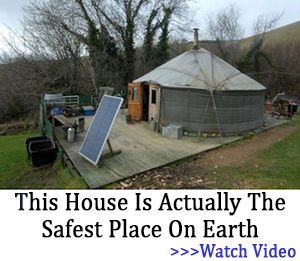 5 Things You Can Do If People Find Out You’re A Prepper
5 Things You Can Do If People Find Out You’re A Prepper
The Pocket Soup that Saved the Lewis and Clark Expedition (Video)
What To Do With Your Frozen Food If The Power Goes Out
The Best Long-Lasting Protein Sources for a Crisis
How Much Ground Can You Cover Each Day Walking with Your BOB?

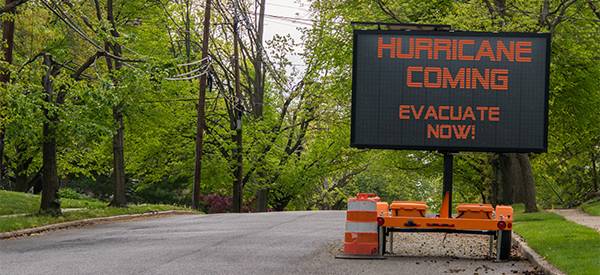













Hardware and Northern Tools sell Ammo Boxes…these are waterproof and compact…you can fill them with freeze dried food…fire making material…first aid kits…2nd amendment items…portable radios..once set up all you have to do is grab them and put the boxes in your vehicle
you don’t put food – much less store it – in anything like an ammo box >> new or otherwise – you get food grade containers for the purpose – off brand “Tupperware is cheap as hell and you then store that in a pop cooler for protections & some security …
Good article, timely and with food for thought about where to go when the hotels aren’t allowed to reach full capacity because of social distancing, and other states may not want anyone from wherever it is we’re from. Even if we plan to camp out in our “steel tent” if it comes to that, we still need other supplies and equipment, as this article reminds us.
Regarding charging the phone: An extra battery can be quite costly, but most of us can charge a phone using our laptop’s battery, or the battery backup box on our main computer, at least a couple of times if not more. That’s a good reason to keep our laptops charged up at the end of the day, even though it’s good for them to run out some of their charge during operation of them. I charge mine up when it gets down below 50%, and at the end of the day regardless of where it is.
Regarding flammable liquids in a home or vehicle where young children are present: It might work out OK but that’s not part of my plan, given that any or all of my four grandchildren, all 5 and under, could conceivably end up here. My next purchase will be a Kelly Kettle or similar, and I’ll keep enough kindling-sized sticks pre-cut for it in an open box inside my garage. This article is a good reminder for me to get on that.
Having food on hand that doesn’t require cooking, enough for several days, also seems like a good idea.
Here’s a childhood memory this article sparked: Mom serving us cereal and milk for dinner by candlelight during a power outage caused by a hurricane. She didn’t want to let the milk spoil as the fridge gradually came up to room temperature. We kids all thought it was fun having breakfast for dinner! Dad was less amused as he set up and operated the big pump we had for the cellar for times like this. I don’t know if it was gasoline powered or some kind of hand pump–I was too young at the time to help, and none of us were allowed in the cellar when it was flooded. Good policy, for lots of reasons.
Me too! As a kid my parents decided to build a vacation home in the middle of no where, at least at the time. I remember spending three seasons there with no electricity, no phone, no gas, no heat, and no car. My dad and my uncle would come out on there days off. The rest of the time, it was my grandmother, mother, aunt, cousin and my sister. Our only luxury for some time was a working pump and a good well! We had delivery by a local milk man once a week and an ice man. There was a block of ice in the bathtub which was our refrigeration. My sister and I would forage with our grandmother. We would fish and clam. We would ride 3 miles on our bikes to a local farm for eggs and vegetables. My mother would cook in the fireplace. We would play cards in the evening by candlelight! My cousin use to cheat at gin rummy! Aside from that, life was good! We were living in paradise. Folks still do that in parts of Scandinavia. Work in the city and escape to small cabins the wilderness whenever they can. We weathered many a hurricane there. Never had to worry about losing electric because we never had any in the first place!
Hide from the wind; Run from the water.
As Ron White said, “It’s not THAT the wind is blowing, it’s WHAT the wind is blowing.” Still waiting to see Cantrell airborn. He shows up in Navarre and everyone crys.
Claude: Please inform Rich M that ammonia is not a disinfectant. It is a household cleaner. There is a distinct difference between the two.
This is the second time in a week that Rich M has stated that ammonia is a disinfectant. I thought we had cleared that misconception up several articles ago.
Ammonia can be used to clean items that otherwise might be resistant to ordinary cleaning methods but it does NOT kill bacteria nor viruses and to posit that it is a germicide is to pass false information.
Ammonia is an excellent degreasing agent (the caustic family members are).
Absolutely, but not a germicide as Rich M. stated. There is a huge difference between a degreaser, no matter how powerful and a germicide.
I have a press degreaser that is no longer available that is so strong it can take cosmoline off in one wipe. I most assuredly wouldn’t use it to clean up a suspected contaminated spot on my kitchen counter.
Hi Left Coast Chuck,
Thank you so much for your comment and for your continuous contribution to the website.
I have edited the article accordingly.
Best Regards,
Claude
Solar powered lights have come a long way in recent years and make a suitable source of alternate lighting. Many of the solar panels on solar lights are sensitive enough that they don’t even need full sun to charge. In any event, if you have several, you don’t need to use them every night. Charging the lights by the window for a couple of days will bring them to full charge.
Unless you are going to be doing something that needs intense light, you really don’t need 1,000 lumens in order to see at night. Remember that our ancestors did quite well for quite a long time with just the light cast by a fireplace or a single candle or oil lamp.
The Coleman lantern is great for outdoors camping but is overpowering inside a normal room. We used to use them every time the electricity went out due to a typhoon on Okinawa, so I got a lot of experience in Coleman lanterns during my twenty-six month vacation on that island.
In addition, if the weather is hot and muggy, a Coleman lantern will add to the discomfort because it really throws a lot of heat too. A solar light with a mirror behind it will throw quite a bit if illumination and be a lot cooler.
A Coleman lantern is at its zenith indoors in the winter time when it provides both light and heat.
we were there from 77-81. you?
’56 to ’58. 3rdMarDiv. HqBn Camp Courtney, Called Camp Tengan when we first opened it after being closed for some years.
Would be helpful if there was more info about a trauma kit. What’s in it? How to put one together or where to buy and what to look for. I’m assuming also, there needs to be training. I still have my HS Red Cross First Aid Book. Back in the day, had to pass that Red Cross first aid class and a water safety and swim class test in order to graduate HS.
CC: Check to see if your first aid book advises not to use a tourniquet. If it does, it is outdated. If it describes how to apply a tourniquet, even if it is from 1943, it is now current. What was old is now new. No more mouth-to-mouth stuff. Just chest compressions which used to be called artificial respiration back in the dark ages. It works. I used it to get a small Okinawan girl breathing again after I pulled her out of a deep tidal pool.
The new method doesn’t describe turning the vic over so that any water coming out of the lungs won’t be regurgitated which is important, especially in a drowning incident.
For a trauma kit, think burns, deep cuts, deep puncture wounds, arterial bleeding, collapsed lung, broken bones, gunshot wounds.
While one may consider that gunshot wounds meet a lot of the above criteria, they also present their own peculiar problems. Often they are two-sided wounds, so with gunshot you always have to check for an exit wound as well as an entry wound. It doesn’t do any good to get the entry wound all nicely patched up to have the vic bleed out due to the missed exit wound on his back.
A wound to the buttocks is not the laughing matter most would think it is. My very first investigation involved a .45 wound to the buttocks. Didn’t even exit. Not much bleeding from the entry wound. Although the ambulance was only a quarter mile away and the corpsmen were on scene in a very short time, the vic bleed out before the corpsmen could even start to administer aid. The slug has severed his femoral artery and he had bled out internally. His buddies thought he was faking when he lost consciousness.
Even if he hadn’t bled out when he did, he would have by the time they got him to the hospital and into a surgical suite. So, if you are treating a wound to the buttocks, do not assume that it is a minor matter.
The other thing with gunshot wounds is that they take the crud from the powder and what is in the barrel that sticks to the slug, plus whatever junk the slug has passed through on the way to the vic, plus whatever junk is on the vic’s clothing as well as his clothing deep into the wound. That’s why you should never stuff junk into the wound to stop bleeding. You are just pushing all that junk carried into the wound further in where it can fester and lead to an overwhelming blood infection.
During WWII and I suppose even now, Marines going ashore to capture an island were ordered to don clean clothes before going over the side into the landing craft. The thought was that although they were going to get dirty mighty fast, as soon as they hit the beach almost, with clean clothes, it would at least lessen that source of infection if wounded.
It would be nice if the member who posted that he had 30 years of experience as an EMT would write an article on treatment of gunshot wounds in the field with emphasis on what you might have to do if there is no immediate medical care available. HINT HINT HINT.
I am sure in 30 years he has had plenty of experience in treating GSWs even if he was not an EMT in a battle zone such as Detroit, Baltimore, Neuyauwk City or Nawleans.
Oh, silly me, I left out The City of the Angles (wow is that a misnomer) and, of course ‘Frisco — but if he worked in ‘Frisco, he wouldn’t have a chance to treat GSWs because they don’t have any guns in that city. They are outlawed.
Now, if he were in Oakland, that would be a whole different story. The battle of Fallujah would just have been a warm-up for a slow Saturday night in Oakland, CA.
Sorry, I got off on a political rant. Back to the main topic. The 30-year experience EMT would be the ideal person to write about what is absolutely necessary, what is nice to have and what you really don’t need (like tampons). Hope to hear from him.
God Bless you for taking the time to respond with so much gusto! I am grateful for every word! For some years, I never thought much about things like this. I always depended on my dad. He spent 35 years in the NYFD. Always new what to do in any emergency. Recently there was an incident on my block. I thought it was an accident. Busy cross street always problems. So I did what I always did, went out to see if I could help. Well, this time it was a shoot out. Drug dealers took over the corner house which was for sale and got into an argument with each other! As soon as I opened the door an officer yelled out at me, lady get back in the house! That got me thinking about what to do and the first thing that came to mind was to bone up on first aid! Yes, my book does include that information. My son gave me Israeli bandages. He said they were good to have on hand. Next time I know to go upstairs too and stay in the center hallway. And there will be no more looking out the window let alone going outside. For one evening, my normally quiet neighborhood turned into a war zone. Hope it never happens again, but if it does, next time I want to be better prepared! Thank you again so much for this help. It is very much appreciated!
CC: To go along with the Israeli dressings, start acquiring a stock of 4 x 4 pads. They are good for wound cleansing, make good bandages and if the paper is intact they are supposed to be sterile.
While tourniquets are becoming commonplace they are a little lower on my list of must haves. Any belt will serve as a tourniquet although in my opinion, I think web belts work better — for me at least— than leather.
Many thanks LCC! Will do ASAP! With the hurricane, I expect everybody will be out and about soon buying milk, bread, water and toilet paper! The stores maybe a little crowded tomorrow, but I should have no problem picking up what I need!
I have the essentials to heat, cook, surgical repaires, batteries and flashlights with a solar battery charger. Camping tent, mess kits, air mattresses and sleeping bags. Et. I have tarps, nails, screws, and more for temp repairs to my home. Don’t have window coverings. We don’t live near either coast.
I keep bbq sized propane tanks filled at most times. I own 2 generators q400 and a 9k. Keep 15 gallons of gas in rotation to keep it fresh. Have additives if needed to keep it fresh longer.. Have 10 gallons of diesel on hand for tractor. Have power tools and hand tools for most jobs. We use little electricity and heat with wood or pellets and can cook on that heater. Have propane water heater, cookstove and a Mr Buddy heater. Have several old fashioned kerosene lanterns and mirrors to multiply the light. Have candles. Multiple fire starting methods. Food stored for a year or more. Beverages and mixes to last a long time. 20 gallons of water plus 2 or more cases of water bottles. A well with a winch. Plan to order a new well bucket soon that fits down the 4″ well casing. A new toilet plunger and 3, 5 gallon buckets for doing laundry. A years worth of laundry supplies.
Herbs, sprouts and micro greens grow in the kitchen window. A lovely garden outside, and equipment for future hydroponics and winter heater in a greenhouse.
We plan now to bug in, under most circumstances. Wildfire would be the exception. Several bags and camping gear packed and stored in a bench by the front door. Easy to grab and go. Vehicles never below 1/2 tank gas.
2 bows and arrows, 1 cross bow and 18 bolts and two more formidable weapons all handy to grab and go. Or just handy for loose dogs after my critters.
Hurricanes are something we worry about in Arizona. No hurricanes, no monsoon rains. No rains, we dry out in a hurry. Best bet for rain are storms coming up the coast of western Mexico, then inland. I keep telling weather people, ask for global warming freaks to come in and give a lecture why we’re in a drought, then it might snow in August. I get a lot of LOL and yeah, God is laughing at them again. 🙂 niio
I have been enjoying your site for a few years now, but never felt it worth writing, as you cover things well, and I don’t need to load up your site with my own prep lists, just saying I pay attention to yours.
But,,,,,I just wanted to mention here that, as long as you are bringing up Hand Sanitizing products, it might be good to caution people that currently there are a good number of products out on the market that were RUSHED onto the shelves as a result of the China Virus, that have methanol in them, which is toxic if a goodly amount is absorbed into the skin. I ended up seeing some of the stuff I recently got had methanol in it, from finding a recall on it. Luckily, the store accepted the return, and had a suitable replacement.
The FDA has a site listing the ones to look out for,
https://www.fda.gov/drugs/drug-safety-and-availability/fda-updates-hand-sanitizers-consumers-should-not-use
Seems most of the recalled stuff is from Mexico, but check these out, please.
Love your postings, often forward them to friends and family. Thanks for all you do.
The only alcohols to apply to your skin are ethanol and isopropyl alcohol also known as IPA. Methanol is what is used in the most effective paint strippers. It’s the stuff that advises to use rubber gloves and use only in a well ventilated space. Actually using it indoors makes you wish you had move the item outside even if the indoor space is “well ventilated”.
Ethanol is grain alcohol. It is what you put in your stomach that makes you think you are twenty years old, six feet tall and in perfect physical condition. It has a tendency to make one say, “Watch this” while doing really dumb things.
I agree with you, kind sir. You seem to be one of the more prolific responding people I see on here, and I have enjoyed your treatises. I even adopted some of your China Virus protection methods and incorporated them into my wife’s and my protocols. Thanks for contributing your many decades of life experiences.
I just didn’t want anyone here to inadvertently use the wrong stuff, as it was clearly NOT marked on the bottles I had.
Hi Hi-Style,
Thank you so much for your comment and your wonderful feedback.
I really appreciate you took the time to let us know about methanol.
God bless,
Claude
I live in N Fl and fortunately this storm ISS… whatever has moved out to sea for the time. Thought something was up when feeding horses and the wind was from the West. But trying to find hand sanitizer of ANY make has been out of the question since this China virus started. Right now if a bad one comes I will be staying at home so can better care for the horses and dogs. Better to let out in the fields than go anywhere, plus I do not have a trailer to take them anywhere. Just put up all the missile hazzards that I use every day and for the most part will be ok.
Sounds Like a very sensible plan. Soap and water is still our best bet. I have been in FL on business many times when the state is preparing for hurricanes. On the whole, id say after Andrew’s wake up call, the state really does a pretty good job! As a matter of fact, this City Chick was downright impressed! If you go further up the coast to the northern states, they do absolutely nothing! Even after Sandy, the response to which was a total failure, they still haven’t gotten the message. When the National Guard arrived at the local armories, there was no supplies and no equipment. Cuomo sold whatever was in storage and spent the money on something else. They had to borrow a generator in Manhattan from a fashion show to set up a computer. Bloomberg told homeowners that the city did a great job! He basically told them to go scratch when they were washed out. No one was prepared at home. Everybody thought everything should somehow magically be provided for them. People really had a hard time. Many still along the coastal areas still haven’t recovered financially and are still dealing with bureaucratic red tape. Good luck to you this hurricane season! I have many friends and family in Florida.